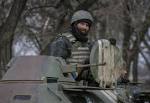 The commander of U.S. forces in the European Union Lieutenant-General Ben Hodges among potential hazards from the capital of Russia was named Russia's ability to block access to the Baltic and Black seas. The commander of U.S. forces in the European Union Lieutenant-General Ben Hodges among potential hazards from the capital of Russia was named Russia's ability to block access to the Baltic and Black seas.
"given the potential that Russia has concentrated in Kaliningrad, it is when the will can block access to the Baltic sea," said Hodges in an interview to Defense News, noting that similar opportunities in the capital of Russia, as if it exists in the Black sea.
Lieutenant General is also called "not a very good combination of" deficiencies of American troops in the intelligence and warning system and the ability of Russia to deploy significant forces. At the same time Hodges said the North Atlantic countries of the Commonwealth are respected consensus with Russia about a ban on the construction of bases at its borders." The Alliance respects the Founding act between Russia and NATO, which says that no NATO bases will be created in the countries of the former Warsaw Pact. It is not a contract, but It was a contract. For this reason, I think, to preserve the unity of the Commonwealth, the vast number of countries will not support the deployment of NATO bases closer to Russia's borders, " said Hodges. At the NATO conference, which was held in September 2014 in Wales, the allies adopted the So-called " Plan of action for maintaining readiness ", the necessity of which the Alliance justified the situation around Ukraine. So, were strengthened mission air patrol the Baltic States, aircraft with radar equipment make regular flights over Poland and Romania, introduced additional NATO ships in the Baltic and Mediterranean seas. In addition, the Alliance said about the increase in the constant presence of staff, program expansion exercises, strengthening early warning systems and strengthen the capacity of response forces.
sections: Politics
|